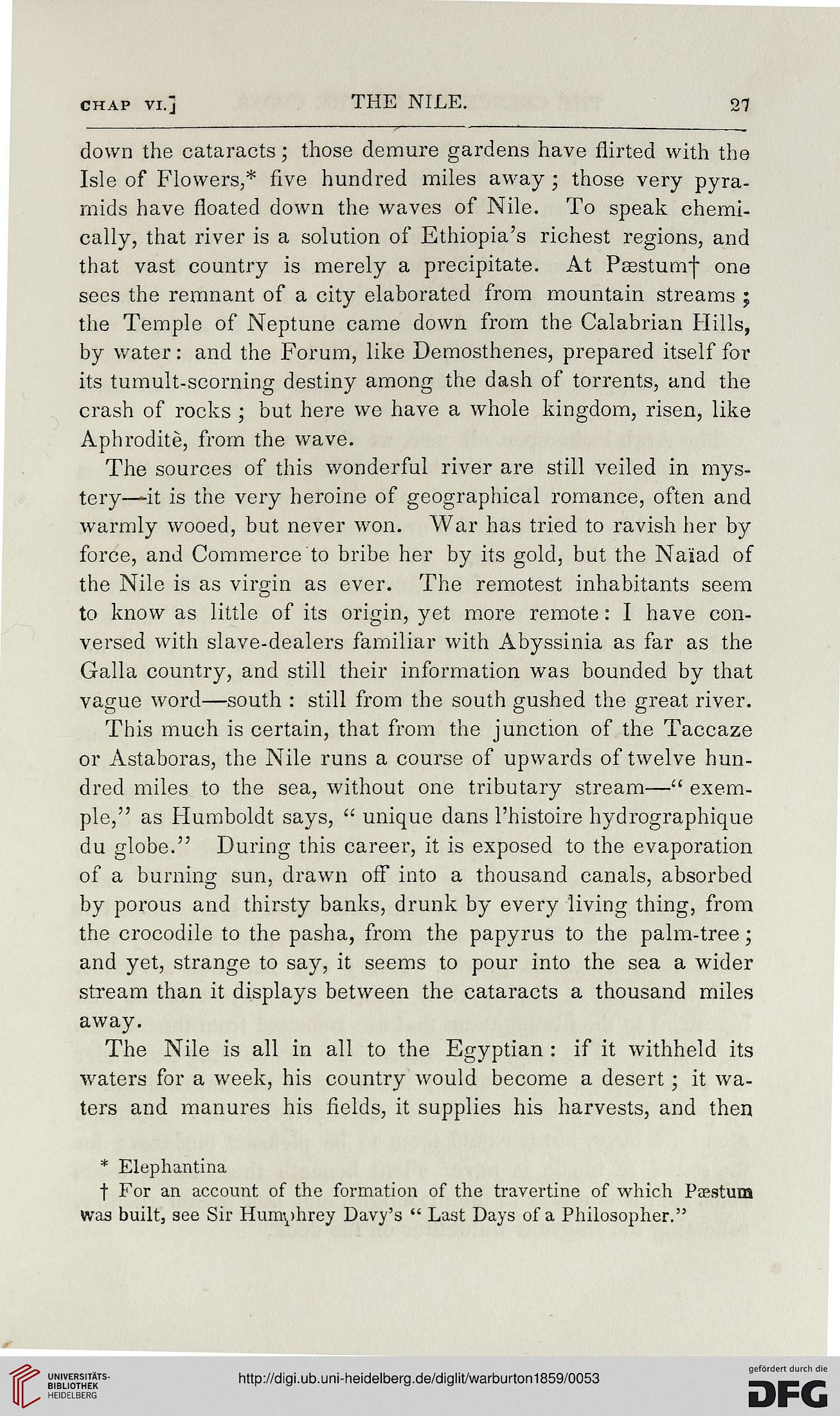CHAP VI. j
THE NILE.
27
down the cataracts; those demure gardens have flirted with the
Isle of Flowers,* five hundred miles away ; those very pyra-
mids have floated down the waves of Nile. To speak chemi-
cally, that river is a solution of Ethiopia's richest regions, and
that vast country is merely a precipitate. At Peestumj- one
sees the remnant of a city elaborated from mountain streams ;
the Temple of Neptune came down from the Calabrian Hills,
by water: and the Forum, like Demosthenes, prepared itself for
its tumult-scorning destiny among the dash of torrents, and the
crash of rocks ; but here we have a whole kingdom, risen, like
Aphrodite, from the wave.
The sources of this wonderful river are still veiled in mys-
tery—it is the very heroine of geographical romance, often and
warmly wooed, but never won. War has tried to ravish her by
force, and Commerce to bribe her by its gold, but the Naiad of
the Nile is as virgin as ever. The remotest inhabitants seem
to know as little of its origin, yet more remote: I have con-
versed with slave-dealers familiar with Abyssinia as far as the
Galla country, and still their information was bounded by that
vague word—south : still from the south gushed the great river.
This much is certain, that from the junction of the Taccaze
or Astaboras, the Nile runs a course of upwards of twelve hun-
dred miles to the sea, without one tributary stream—" exem-
ple," as Humboldt says, " unique dans l'histoire hydrographique
du globe." During this career, it is exposed to the evaporation
of a burning sun, drawn off into a thousand canals, absorbed
by porous and thirsty banks, drunk by every living thing, from
the crocodile to the pasha, from the papyrus to the palm-tree;
and yet, strange to say, it seems to pour into the sea a wider
stream than it displays between the cataracts a thousand miles
away.
The Nile is all in all to the Egyptian : if it withheld its
waters for a week, his country would become a desert ; it wa-
ters and manures his fields, it supplies his harvests, and then
* Elephantina
f For an account of the formation of the travertine of which Paestum
was built, see Sir Humphrey Davy's " Last Days of a Philosopher."
THE NILE.
27
down the cataracts; those demure gardens have flirted with the
Isle of Flowers,* five hundred miles away ; those very pyra-
mids have floated down the waves of Nile. To speak chemi-
cally, that river is a solution of Ethiopia's richest regions, and
that vast country is merely a precipitate. At Peestumj- one
sees the remnant of a city elaborated from mountain streams ;
the Temple of Neptune came down from the Calabrian Hills,
by water: and the Forum, like Demosthenes, prepared itself for
its tumult-scorning destiny among the dash of torrents, and the
crash of rocks ; but here we have a whole kingdom, risen, like
Aphrodite, from the wave.
The sources of this wonderful river are still veiled in mys-
tery—it is the very heroine of geographical romance, often and
warmly wooed, but never won. War has tried to ravish her by
force, and Commerce to bribe her by its gold, but the Naiad of
the Nile is as virgin as ever. The remotest inhabitants seem
to know as little of its origin, yet more remote: I have con-
versed with slave-dealers familiar with Abyssinia as far as the
Galla country, and still their information was bounded by that
vague word—south : still from the south gushed the great river.
This much is certain, that from the junction of the Taccaze
or Astaboras, the Nile runs a course of upwards of twelve hun-
dred miles to the sea, without one tributary stream—" exem-
ple," as Humboldt says, " unique dans l'histoire hydrographique
du globe." During this career, it is exposed to the evaporation
of a burning sun, drawn off into a thousand canals, absorbed
by porous and thirsty banks, drunk by every living thing, from
the crocodile to the pasha, from the papyrus to the palm-tree;
and yet, strange to say, it seems to pour into the sea a wider
stream than it displays between the cataracts a thousand miles
away.
The Nile is all in all to the Egyptian : if it withheld its
waters for a week, his country would become a desert ; it wa-
ters and manures his fields, it supplies his harvests, and then
* Elephantina
f For an account of the formation of the travertine of which Paestum
was built, see Sir Humphrey Davy's " Last Days of a Philosopher."





